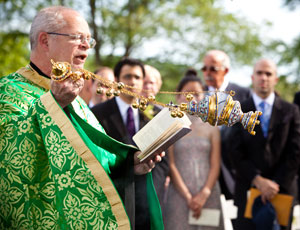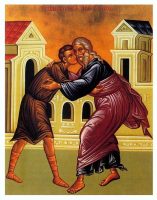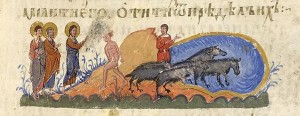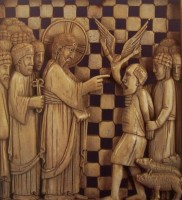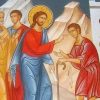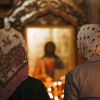Sermon on the Twentieth Sunday after Pentecost
At that time, Jesus went to a city called Nain, and his disciples and a great crowd went with him. As he drew near to the gate of the city, behold, a man who had died was being carried out, the only son of his mother, and she was a widow; and a large crowd from the city was with her. And when the Lord saw her, he had compassion on her and said to her, “Do not weep.” And he came and touched the bier, and the bearers stood still. And he said, “Young man, I say to you, arise.” And the dead man sat up, and began to speak. And he gave him to his mother. Fear seized them all; and they glorified God, saying, “A great prophet has arisen among us!” and “God has visited his people!”
“For perfect hope is achieved on the brink of despair, when instead of falling over the edge, we find ourselves walking on air.” Thomas Merton
Change is hard and some changes are harder than others, but all are reminders that everything in this life is passing away and if we cannot let go of this world we cannot be followers of Christ.
Jesus meets many of the people in the New Testament at times of crisis, when suffering is great, and the need is immediate, like in today’s Gospel. Other times he meets people at times when life is being lived at a normal pace, when there is no particular need, no death, or sickness, like the Samaritan Woman or at Mary, Martha, and Lazarus’ house for dinner.
Wherever He went, whoever He met, whatever circumstance He encountered, He brought a message of profound compassion. Even when His words seemed harsh, the message was meant to move his listeners from where they stood to a place closer to Him and to divine freedom. Christ offers a way of healing that reaches deep into the depths of human life, that often shakes the foundations of life itself, that is unpredictable. In Him the dead are made alive.
But notice. It is usually the poor and needy that find Him. They are the ones who recognize Him for Who He Is. The Psalmist wrote that “a broken heart He will not despise” which means that He understands our brokenness far better than we do, for most of us do not even know that we are broken.
Speaking in parables and often in ambiguous terms, Jesus never offered easy answers. He offered no instruction book or magical formulas. Instead He opened doors to divine wisdom that lay just beyond the reach of those who came to Him in order to stretch them and to challenge them to change both thought and life. God does not change us without our permission. We, together with Him, cooperate in the changes that are necessary. No matter how much Bible reading one does, or services one attends, or words of wisdom one collects, none of it will profit unless a new way of life is born us. Our brokenness must be healed.
Thomas Merton wrote: “Having faith in Christ without undergoing healing in Christ is no faith at all.”
The Lord takes the material offered to him by each present moment and cares for the task at hand whatever it may be. Often he makes a lesson out of it, or a miracle, or something else wholly appropriate to the moment. You never hear of Jesus wishing he were someplace else except perhaps in the Garden of Gethsemane where he struggled with his coming torture and death, but he resolved his internal crisis with acceptance, “Not as I will, but as You will.”
The only son of the widow died. The crisis for this woman was intense. She would no longer have the support of her son. She could easily have become destitute without his help. So, the pain caused by his death was not her only problem. When Jesus saw her he had compassion. Jesus is compassion. “Do not weep,” he said and then raised her son from the dead. Jesus relieved her of her temporal suffering.
Still the solution to her deepest suffering was yet to be met. Death would come again to both of them, to one first and then the other. She did not yet know the true freedom that comes from non-attachment to this temporal world. God is Spirit and He comes and goes like the wind, as Jesus tells us. If we are tied down to this world, we cannot follow Him as He comes and goes. If we are to be His true followers we must become free also, as free as the wind. To be free is to not be afraid to let go, to hold on to nothing that is passing away, to trust wholly in Christ who is Deathless, and to become like Him in whose image we have been created. “There is coming a time,” Jesus told the Samaritan woman, “that the true worshippers would worship not on this mountain or in Jerusalem, but in spirit and in truth.” The mountain and Jerusalem represent the world and its attachments. Spirit and truth represent freedom from all temporal things.
Source: Saint Mary Orthodox Church












